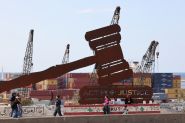
The Minister of Public Works and Transport, Fayez Rasamny, expressed his firm determination to guarantee the safety and efficiency of the Port of Beirut.
During an inspection visit to the port on Wednesday, he stressed, “we will work there with the same strength and rigor as we do at the airport.”
After meeting with the port's security forces, the minister stated that the port's security infrastructure was being maintained “with an iron fist.” He also called for enhanced and stricter surveillance to maintain a secure environment.
In response to recurring rumors of arms smuggling, Rasamny formally rejected these allegations, pointing out that they were devoid of any tangible proof.
“We will not allow anyone to doubt the port's ability to function properly. As for yesterday's alarmist speeches, for which proof should be provided, they are devoid of any foundation,” he added firmly.
The minister also emphasized the importance of clarifying the legal framework governing the port and its board of directors. He expressed his intent to review, amend and activate existing laws to ensure a more transparent and efficient management process. “Security is a top priority. The interim committee will inform me of the matters to address, and we will work together to develop them,” he concluded.
Itani: ‘no proof or indication’ of weapons
As for the director of the port, Omar Itani, he announced that there is no proof or indication of weapon smuggling to or from the port.
Itani explained that the port administration's powers are limited to logistical tasks, such as organizing vessel movements, unloading and loading cargo, storage, and coordinating operations within the port. Regarding the quality of goods, customs duties, and fee collection, these fall under the jurisdiction of the Lebanese Customs Administration, which holds exclusive authority over all Lebanese ports, including Beirut Port, as per the law.
Therefore, the port administration does not have the authority to inspect the nature or content of goods. Its role is strictly focused on facilitation and logistical oversight. Detection and auditing operations, however, are carried out in coordination between the Customs Department, the Lebanese Army, and other security agencies within the port, as part of a unified control system aimed at preventing any violations.
Itani noted that in recent years, these security measures, especially those implemented by the Lebanese Army, have been significantly strengthened to prevent violations and smuggling. He explained that steps have been taken to enhance control levels and modernize equipment, including the introduction of advanced scanning devices similar to those used in international ports.
Itani emphasized that this approach not only aims to improve security but also seeks to streamline export activities, particularly to Gulf and European markets, benefiting farmers, productive sectors, and boosting state revenue.
He also revealed that Beirut Port had seen significant improvements in its international ranking during 2023 and 2024. Both productivity and security were notably enhanced, with the port’s global ranking rising to 67th, a clear reflection of efforts to develop this strategic facility.
Itani concluded by reiterating the importance of continuing to tighten procedures by all parties working within the port. He emphasized that, as confirmed by the Minister, there is still no evidence of violations or breaches in this regard.
Rasamny's visit comes on the heels of a Western warning against arms trafficking via the port of Beirut. On Tuesday, the pan-Arab channel Al-Hadath reported information, citing a Western source, that Iran and Hezbollah have altered their weapons trafficking strategies towards Lebanon, now relying solely on maritime routes. “Since the fall of Bashar al-Assad in Syria and air restrictions, Hezbollah has been using the sea to transport weapons,” the source said, adding that this new form of trafficking represents “a dangerous turning point threatening Lebanon's security and international investment in the country.”



Comments